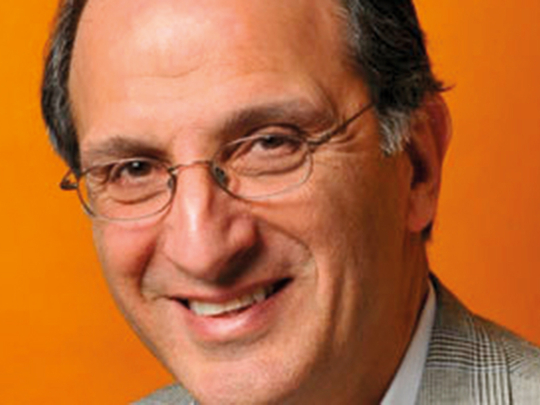
Abu Dhabi: At least six in 10 moderately religious people in the UAE, Saudi Arabia, Morocco and Egypt (and 58 per cent in Tunisia) think the state should govern only according to the spirit of Sharia or as a civil institution, a recent poll showed.
Zogby Research Services, specialising in research and communications and undertaking polling across the Arab world, surveyed 13,469 people in nine Arab countries (the UAE, Saudi Arabia, Kuwait, Morocco, Algeria, Tunisia, Egypt, Jordan, and Palestine) between March 19 and April 6, to explore their attitudes towards political Islam.
Speaking exclusively to Gulf News on the sidelines of the Promoting Peace in Muslim Societies forum, Dr James Zogby, the founder and president of the Arab American Institute (AAI), a Washington, D.C.–based organisation which serves as a political and policy research arm of the Arab-American community, said that diving deeply into the data from five countries in this survey — the UAE, Saudi Arabia, Morocco, Tunisia and Egypt — they found a majority of Moroccan moderates or adapters (56 per cent), pluralities of moderates in Egypt (45 per cent) and the UAE (39 per cent) holds the most liberal viewpoint on the aspect of should the state govern without Sharia and leave matters of faith to religious authorities.
Dr Zogby, also managing director of Zogby Research Services, said review of the data “led us to better understand the two groups of interest for this report: moderately religious or adapters and very religious or formalists”.
The adapters, as evident in the term, are less formalistic or rigid in their approach to their faith. They pray and go to their local mosque as often as they can and do not report listening frequently to religious programmes or consulting fatwas. They are far more tolerant of other faiths and sects and have a positive view of modernity.
Adapters strongly support the view that their own countries are moving in the right direction. Rather than rigid ritual observance, they tend to support the notion that religion should lead one to live a better, more moral life. They believe in the civil nation-state and maintain that religious groups should focus on promoting spirituality. They largely share the view that when religious groups have governed, they have made their countries weaker and ineffective in protecting the rights of all citizens.
Finally, adapters are largely inclined to see extremist groups like Daesh or Al Qaida either as “not Muslims” or as a “misguided perversion of Islam”.
On the other hand, the very religious or formalists are more observant of rituals. They pray more often, go to their mosques more frequently, spend more time listening to religious programming, and, in some countries, report consulting fatwas more frequently. They are also less tolerant of other faiths and sects and have a negative view of modernity.
The poll showed at least seven in 10 moderately religious people in the UAE (74 per cent), Morocco (74 per cent), and Saudi Arabia (70 per cent) as well as 60 per cent of Adapters in Tunisia say their countries are heading in the right direction.
Strong majorities of formalists in all five of the countries reviewed here say their countries are heading in the wrong direction, including almost all formalists in Egypt (98 per cent) as well as 87 per cent in Morocco, 82 per cent in Tunisia, 71 per cent in the UAE, and 65 per cent in Saudi Arabia.
Dr Zogby said while majorities of respondents overall in these five countries agree that with respect to groups such as Daesh, Al Qaida, and Ansar Bait Al Maqdis, they either do not consider them Muslims or regard them as “a misguided perversion of the teachings of Islam”, “there are some troubling findings when we look more deeply at the data”.
“The poll revealed in all five countries, that the percentages of formalists who say these groups “are mostly right” or “correct and follow a rightly guided path” are significantly higher than the often negligible percentages of adapters who agree (e.g., in the UAE, 17% formalists vs 4% adapters). In addition, the numbers of formalists who hold these views (i.e., that groups like Al Qaida and Daesh are mostly right or correct) are: Egypt (20 per cent), Saudi Arabia (27 per cent), Morocco (41 per cent), and Tunisia (44 per cent) and this is worrisome.”
Finally, when respondents were asked if they think that “groups espousing a politicised version of Islam should be seen as potential ‘gateways’ to extremism”, Dr Zogby said they found the majorities of adapters agreeing that these groups are gateways to extremism and very strong majorities of formalists (in some cases, near unanimity) disagreeing with this assertion.
Dr Zogby said the strongest agreement that groups that politicise religion lead to extremism is among adapters in the UAE (69 per cent) and Saudi Arabia (65 per cent).
“On the other hand, 99 per cent of formalists in Morocco and Egypt and 95 per cent of such respondents in Tunisia say these groups are not gateways to extremism, as do 87 per cent of formalists in Saudi Arabia and 83 per cent in the UAE,” Dr Zogby said.








